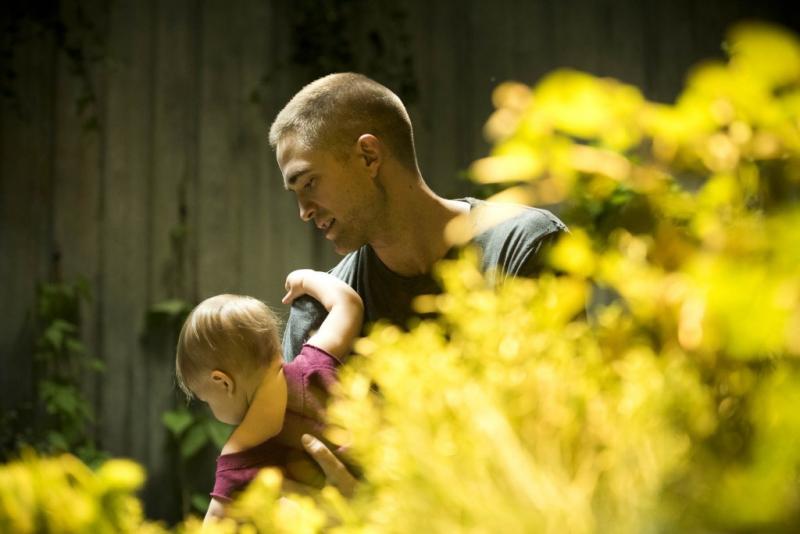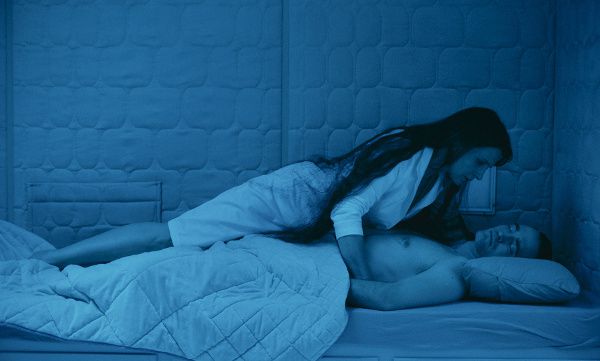High Life review - Claire Denis boldly goes where she hasn't gone before | reviews, news & interviews
High Life review - Claire Denis boldly goes where she hasn't gone before
High Life review - Claire Denis boldly goes where she hasn't gone before
Lust in space: the veteran French director takes on existential science fiction
Thursday, 09 May 2019

Father and daughter adrift with Robert Pattinson as Monte,
Claire Denis's High Life is science fiction as a fever dream rather than a frenzy of ray guns and aliens. Our first contact is Monte (played by a gaunt Robert Pattinson); he’s alone on a rickety space ship, fixing the leaks in the hull, nurturing both the crops in the biosphere and his baby daughter, Willow. Pattinson is a mesmerising screen presence with his close-cropped skull and sharp-angled jaw; there’s real tenderness in the opening scenes where he interacts with the infant as her sole parent. But that idyll doesn’t last; Monte is the last survivor of a crew of murderers, who chose a one-way space mission in preference to the death penalty. In long flashback sequences we meet the other prisoners, a discordant company of violent men and women, made uniform only by their mutual suspicion. We learn what brought them to this prison ship and their fate once on board.Is High Life a meditation on the nature of space and time? If so, it’s a mystery why Monte doesn’t age at all while his daughter reaches maturity on their long, lonely voyage. There may well have been consultations with philosophical scientists about string theory and black holes in crafting the script but anyone looking for expository dialogue will be disappointed. Claire Denis has spoken about having the idea for High Life in her mind for some 15 years. Certainly there’s been time to watch and reference other filmmakers’ interstellar explorations - High Life conjures up memories of the eco-fable Silent Running and the underrated Alien 3 as well as Tarkovsky’s Solaris. Although it’s French director Denis’s first film in the English language, her familiar themes are all present: female sexual desire, the shifting power play between overseers and servants, colonialism, enclosed communities moulded by their physical environment. She’s well served by Robert Pattinson, working hard as he did in last year’s Good Time, to shrug off his teen-idol Twilight image. He’s a celibate Prospero left alone with a ripening Miranda; it’s no accident that the first word he teaches her is "taboo". Juliette Binoche gives a performance striking for its lack of vanity as prisoner-scientist Dr Dibbs (below). On earth, she murdered not only her husband but also her children. In space she’s Medea extracting and inserting sperm from her fellow prisoners for experiments in reproduction. Denis is unflinching in her focus on bodily fluids – rarely has a movie paid so much attention to corporal secretions. In one already notoriously grim scene, Dibbs performs alone in the space ship’s "sex box". With her swirling mane of dark hair, she resembles one of Edward Munch’s hollow-eyed Eves, tortured by insatiable desire. It’s certainly no replay of Jane Fonda having fun with the orgasmatron in Barbarella.
 The slow pace and pretensions of High Life make it hard to love and it’s distinctly challenging for the squeamish. But it’s quite possible to admire its bravura performances and the director’s design choices. Denis rebuffs CGI for dilapidated sets and in-camera effects. She chooses her collaborators well - an epiphanous final illumination was inspired by Icelandic artist Olafur Eliasson’s light installations while Tindersticks’ Stuart Staples provides an atmospheric score.
The slow pace and pretensions of High Life make it hard to love and it’s distinctly challenging for the squeamish. But it’s quite possible to admire its bravura performances and the director’s design choices. Denis rebuffs CGI for dilapidated sets and in-camera effects. She chooses her collaborators well - an epiphanous final illumination was inspired by Icelandic artist Olafur Eliasson’s light installations while Tindersticks’ Stuart Staples provides an atmospheric score. The future of Arts Journalism
You can stop theartsdesk.com closing!
We urgently need financing to survive. Our fundraising drive has thus far raised £49,000 but we need to reach £100,000 or we will be forced to close. Please contribute here: https://gofund.me/c3f6033d
And if you can forward this information to anyone who might assist, we’d be grateful.

Subscribe to theartsdesk.com
Thank you for continuing to read our work on theartsdesk.com. For unlimited access to every article in its entirety, including our archive of more than 15,000 pieces, we're asking for £5 per month or £40 per year. We feel it's a very good deal, and hope you do too.
To take a subscription now simply click here.
And if you're looking for that extra gift for a friend or family member, why not treat them to a theartsdesk.com gift subscription?
more Film
 Can I get a Witness? review - time to die before you get old
Ann Marie Fleming directs Sandra Oh in dystopian fantasy that fails to ignite
Can I get a Witness? review - time to die before you get old
Ann Marie Fleming directs Sandra Oh in dystopian fantasy that fails to ignite
 Happyend review - the kids are never alright
In this futuristic blackboard jungle everything is a bit too manicured
Happyend review - the kids are never alright
In this futuristic blackboard jungle everything is a bit too manicured
 Robert Redford (1936-2025)
The star was more admired within the screen trade than by the critics
Robert Redford (1936-2025)
The star was more admired within the screen trade than by the critics
 Blu-ray: The Sons of Great Bear
DEFA's first 'Red Western': a revisionist take on colonial expansion
Blu-ray: The Sons of Great Bear
DEFA's first 'Red Western': a revisionist take on colonial expansion
 Spinal Tap II: The End Continues review - comedy rock band fails to revive past glories
Belated satirical sequel runs out of gas
Spinal Tap II: The End Continues review - comedy rock band fails to revive past glories
Belated satirical sequel runs out of gas
 Downton Abbey: The Grand Finale review - an attemptedly elegiac final chapter haunted by its past
Noel Coward is a welcome visitor to the insular world of the hit series
Downton Abbey: The Grand Finale review - an attemptedly elegiac final chapter haunted by its past
Noel Coward is a welcome visitor to the insular world of the hit series
 Islands review - sunshine noir serves an ace
Sam Riley is the holiday resort tennis pro in over his head
Islands review - sunshine noir serves an ace
Sam Riley is the holiday resort tennis pro in over his head
 theartsdesk Q&A: actor Sam Riley on playing a washed-up loner in the thriller 'Islands'
The actor discusses his love of self-destructive characters and the problem with fame
theartsdesk Q&A: actor Sam Riley on playing a washed-up loner in the thriller 'Islands'
The actor discusses his love of self-destructive characters and the problem with fame
 Honey Don’t! review - film noir in the bright sun
A Coen brother with a blood-simple gumshoe caper
Honey Don’t! review - film noir in the bright sun
A Coen brother with a blood-simple gumshoe caper
 The Courageous review - Ophélia Kolb excels as a single mother on the edge
Jasmin Gordon's directorial debut features strong performances but leaves too much unexplained
The Courageous review - Ophélia Kolb excels as a single mother on the edge
Jasmin Gordon's directorial debut features strong performances but leaves too much unexplained
 Blu-ray: The Graduate
Post #MeToo, can Mike Nichols' second feature still lay claim to Classic Film status?
Blu-ray: The Graduate
Post #MeToo, can Mike Nichols' second feature still lay claim to Classic Film status?

Add comment